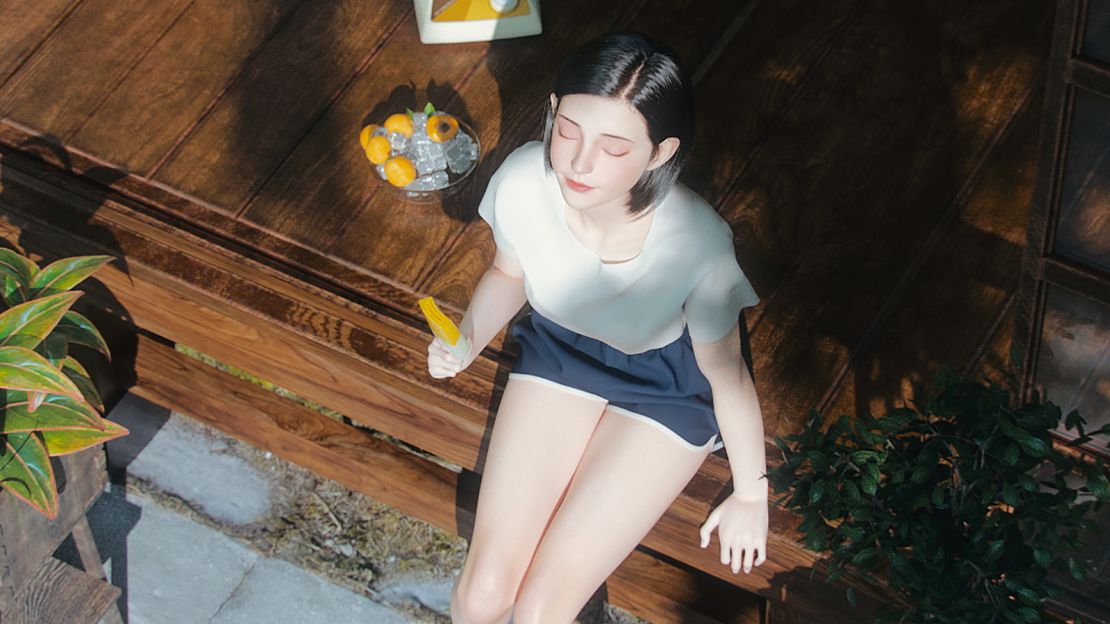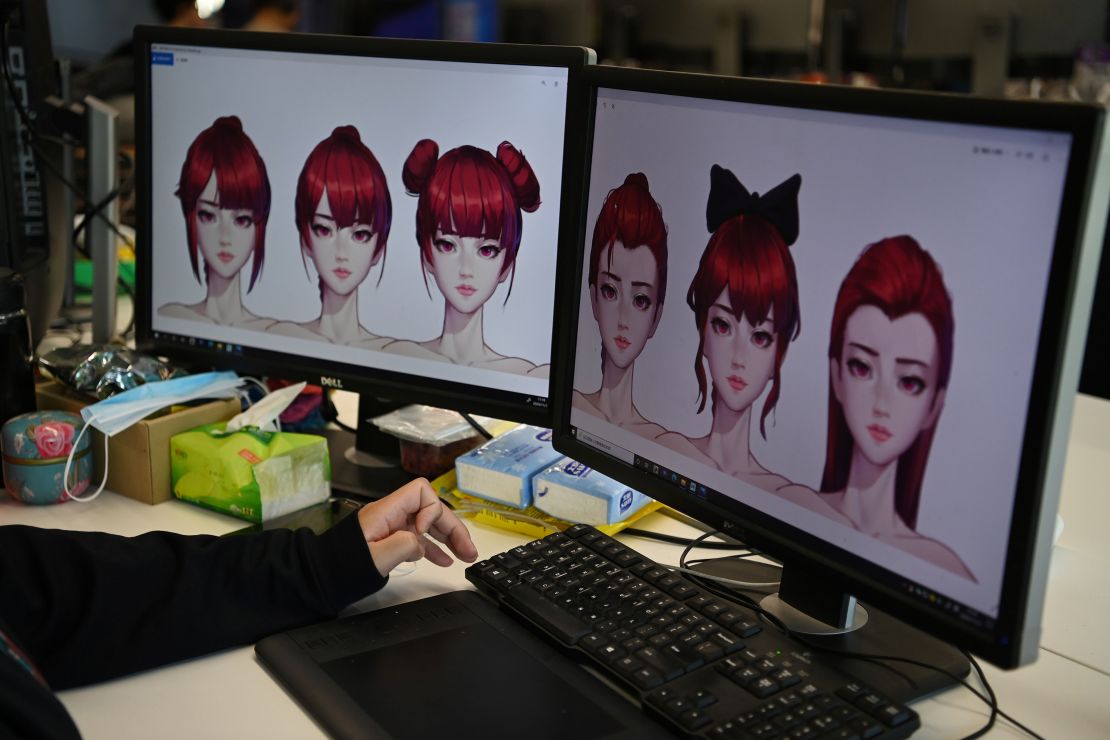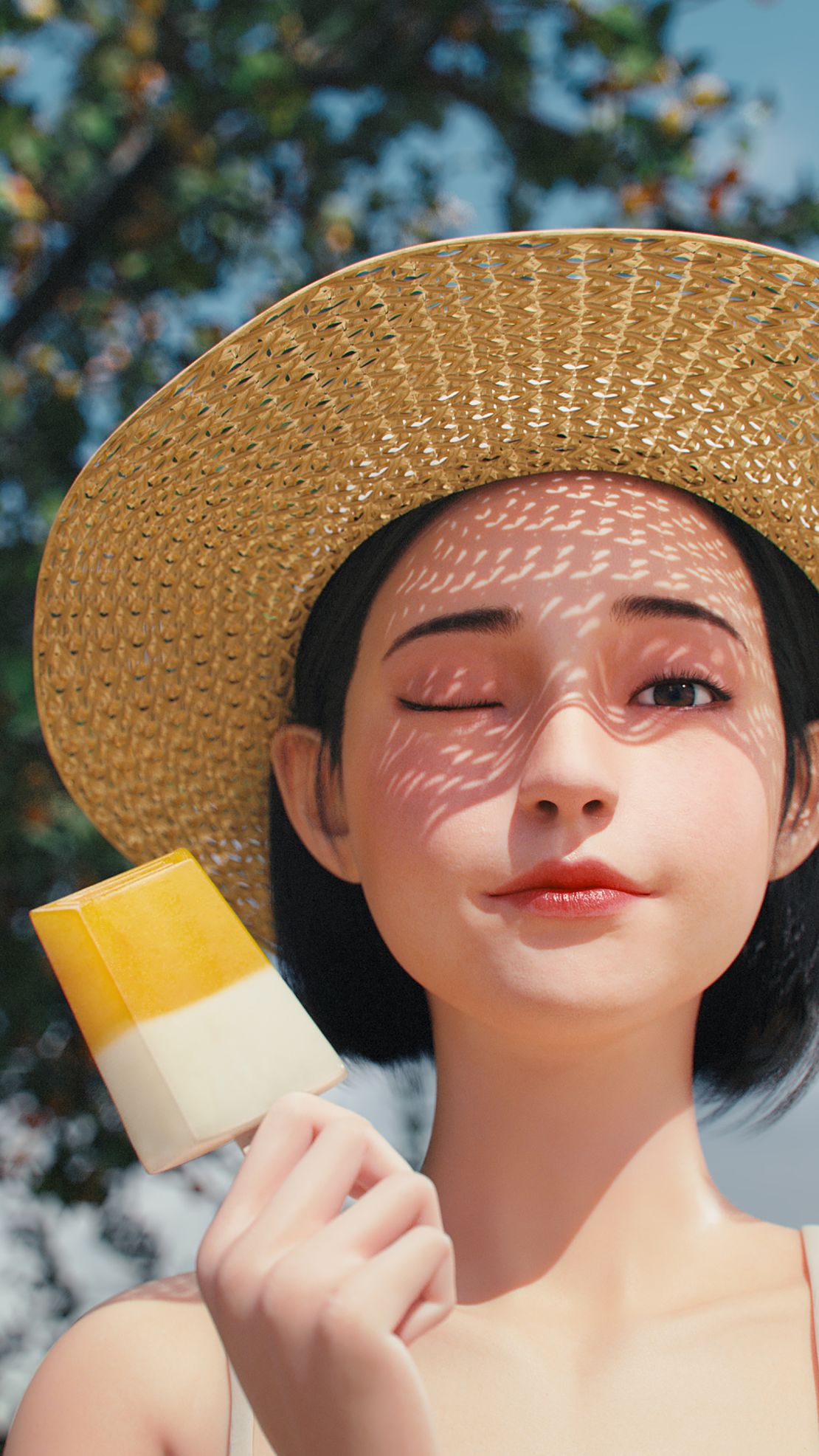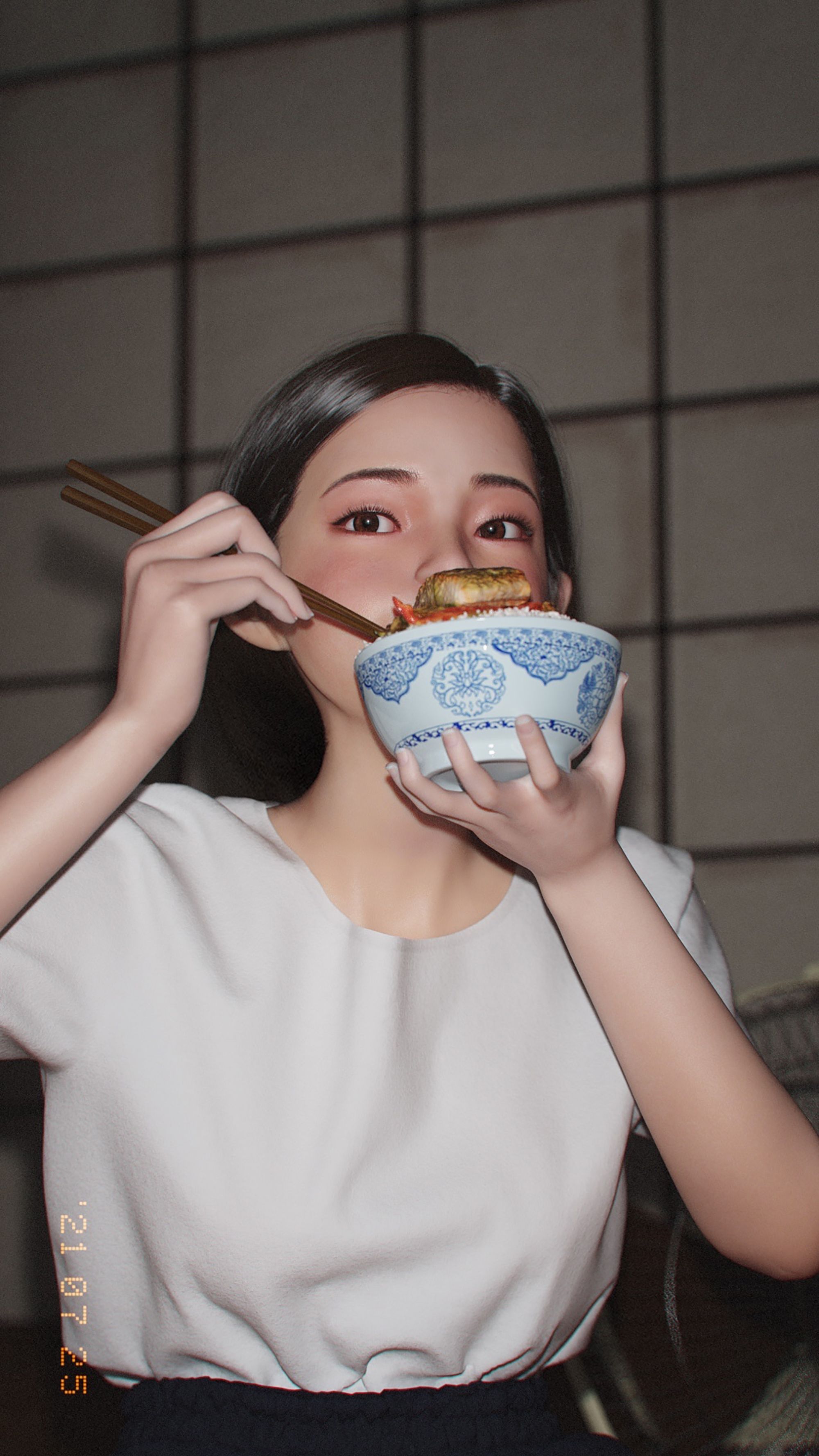“Your skin’s a bit dry,” one user commented on a video posted by Angie, a popular influencer who first appeared on Chinese social media last fall. “You should apply a face mask.”
In the video, uploaded to Douyin, the original Chinese version of TikTok, Angie’s skin looks bumpy and uneven. A gaping yawn reveals slightly crooked teeth.
She doesn’t have “the face of a celebrity,” another user remarked.
Typical influencers might clap back with a comment, but Angie is not a typical influencer – she’s not even a real person.
Angie is an imperfect virtual personality. She may still be conventionally pretty, but unlike China’s other virtual influencers, Angie doesn’t pose in designer clothes, walk the runway or promote new songs. Instead, she sports simple white tees, sips Coca-Cola and yawns on screen.
Sometimes she can be seen with a flushed face, and even zit or two. And her down-to-earth persona is clearly resonating on Douyin, where she has amassed over 280,000 followers to date.

Virtual influencers are nothing new in China. The country’s first digital KOL (key opinion leader) to go viral, Ling, was created in May 2020. With her sharp jawline, slender face and rosy lips, Ling reflects a traditional Chinese beauty ideal. This February she graced the cover of Vogue Me, a fashion magazine targeting China’s “post-’90s” generation,” alongside real-life celebrities G.E.M., Liu Haocun and Liu Yuxin.
But Angie offers a refreshing alternative, her fans say, in a country where demand for plastic surgery is surging and beauty apps compete to create filters that show users more beautiful versions of themselves.
More realistic virtual idols
Angie is the creation of Jesse Zhang, the director of a Shenzhen-based CGI animation company.
Zhang was looking for a way to express his creativity and thought it would be fun to create a virtual character with imperfect features – someone who could help people relax and feel more positive about themselves. Angie started taking shape in July 2020, and within three months Zhang had posted his character’s first video to Douyin. By December, she had already gained around 100,000 fans.
“I didn’t think she would take off so quickly,” he said, attributing her popularity to her calming, casual videos.
“Her characteristics and details all have a bit of this ‘real-life’ feeling,” Zhang said. “But she also has some things a real person wouldn’t have. Her ears are a bit like a fairy’s, and her eyes are round, big and cute.”
Despite knowing she’s not real, many of Angie’s followers eagerly tell her about their day in two group chats on Douyin.
“Some fans will also invite me to talk about things in life – they’re in a predicament, or they encounter some difficulties,” said Zhang said, who responds to comments as Angie in his free time each day.
Some fans have credited Angie with cheering them up or helping them de-stress amid life’s predicaments. “Angie, last time I left you a message saying that lately I was feeling really sad. Now, I’m doing much better,” one fan wrote. “As I was getting ready to take an afternoon nap, I saw your video and was put in an even better mood!”
The follower said they were prepping for the upcoming semester, and that they would strive to work hard in school. “Keep pressing on,” Angie wrote in response, adding that sad moments will become things of the past.
“The reason why I like her is that Angie is more realistic than many people who are actually real,” one of her followers Xiao Qi, a millennial living in the southwestern Chinese city of Chongqing, told CNN. “She gives the impetuous world a touch of beauty.”
Low-risk influencers
For now, Zhang has no plans to monetize Angie by livestreaming, though he is open to collaborations. If the designer were to cash in on the market for virtual influencers, however, he may find a willing audience – on Douyin, fans often support their favorite content creators by sending money during livestreams, ranging from a couple cents to hundreds of dollars or more.
For marketers, virtual influencers are a low-risk alternative to real-life stars – they’re available at all hours of the day to do whatever is required with minimum fuss. Viola Chen, a strategist at Red Ant Asia, said pixel-perfect influencers can also be more easily molded to fit a company’s campaign.

“It is easier for them to be upgraded and customized to fit into different styles and to ensure their image is always on-brand,” Chen said.
But Chen said virtual influencers aren’t about to replace real people. In some campaigns they have come across as inauthentic or too commercialized, she added, like when internet users called out virtual influencer Ling when she posted about Gucci lipstick. According to Chen, fans were unconvinced.
“Followers question if it’s appropriate for virtual influencers to speak for beauty and skincare products whose performance needs to be verified by (human) touches,” Chen said.
Red Ant Asia’s co-founder Elisa Harca agrees, seeing a future where brands’ digital and real-life influencers coexist.
“With any kind of marketing you want to find a blended program so not all your eggs are in one basket,” she said. “Diversity is key in digital – it’s never one size fits all. And you have things that will appeal more to the masses, and more to certain tribes.”
Shifting beauty standards
Angie’s real-life characteristics are part of her appeal – but they have also attracted criticism online. Some Douyin users have disapproved of her thick thighs, creased makeup, faint acne scars and uneven skin.
Underneath one video, in which Angie is seen sipping Coca-Cola, one user asked why she wasn’t created with “double eyelids.” (Around half of East Asian and Southeast Asian women are born with double eyelids. Many opt for a surgical procedure to create a visible crease, known as blepharoplasty, now the most popular cosmetic procedure among people of Chinese descent, according to the academic publication Aesthetic Surgery Journal.)

Criticisms of Angie’s appearance reflect ongoing debates over beauty standards in China. Though there are signs that attitudes may be slowly changing – with stars like the tanned and curvy singer Wang Ju increasingly in the spotlight – female celebrities are often slim and dewy-skinned.
There is still huge pressure on women to conform to certain beauty ideals, according to Jaehee Jung, a professor of fashion and apparel studies at the University of Delaware. Her research into perceptions of attractiveness among college students in Shanghai found that most wanted to change something about their bodies – for example, slimmer bodies or bigger eyes.
“Many of these young women think, ‘Wow, you have to keep up with beauty trends’, otherwise you’re considered lazy,” Jung said.
As such, an imperfect virtual character like Angie is, Jung suggested, more relatable for many Chinese girls and women.
“I think it’s refreshing that you find the complete opposite figure who is almost like a regular person – and she doesn’t have to look like anyone else,” she said. “I think for many viewers, they see themselves.”



